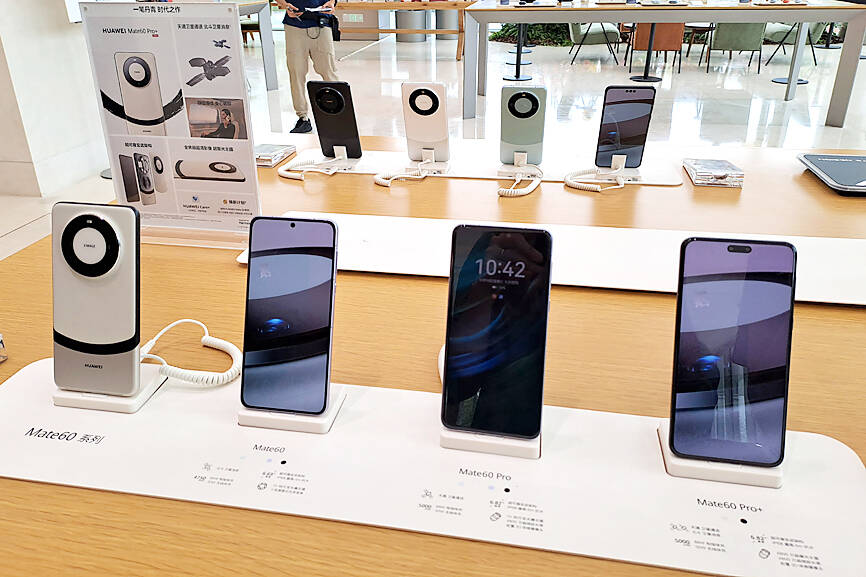Huawei Technologies Co (華為) and Xiaomi Corp (小米) led a resurgence in China’s smartphone market, which shook off oversupply issues and an ailing economy to register double-digit growth last month.
Phone sales in the world’s biggest mobile market were up 11 percent in the first four weeks of last month compared with the same period a year earlier, Counterpoint Research data showed.
Huawei improved by 83 percent, while Xiaomi was up by one-third. Apple Inc’s latest iPhone has had an unusually muted debut in China this year, and domestic rivals are capitalizing with a wide range of new products.

Photo: AFP
Huawei accounted for the bulk of the growth with its new Mate 60 series of phones, Counterpoint said.
The electronics maker sparked global attention and consumer demand by introducing handsets powered by a novel made-in-China 5G chip, which it also added to an upgraded foldable model in the Mate X5.
China’s mobile industry had been mired in a prolonged contraction, following an inventory glut built up a year ago in the midst of COVID-19 Zero lockdowns. Contract chipmakers Taiwan Semiconductor Manufacturing Co (台積電) and Samsung Electronics Co have in the past few weeks said they see that inventory adjustment coming to an end and orders returning to growth.
South Korea, home to Samsung and SK Hynix Inc, yesterday reported that memorychip exports increased last month for the first time in 16 months, offering more evidence for the revival of demand for the country’s most important products.
Memory exports rose 1 percent from a year ago after dropping 18 percent in September, South Korean Ministry of Trade, Industry and Energy data showed.
Multi-chip packages led the rebound, rising 12.2 percent, while the sales of DRAM — the most lucrative category — narrowed their decline to single digits for the first time in more than a year.
The problem for Chinese phone makers has inverted, as Huawei is struggling to produce enough units to satisfy unexpectedly high demand, while Xiaomi’s 14 series has received more than 1 million orders since last month’s launch, Counterpoint said.
The Chinese companies’ success could suggest challenges for Apple Inc, the world’s most valuable company. It has earned almost 20 percent of its revenue from greater China in the past few quarters.

Meta Platforms Inc offered US$100 million bonuses to OpenAI employees in an unsuccessful bid to poach the ChatGPT maker’s talent and strengthen its own generative artificial intelligence (AI) teams, OpenAI CEO Sam Altman has said. Facebook’s parent company — a competitor of OpenAI — also offered “giant” annual salaries exceeding US$100 million to OpenAI staffers, Altman said in an interview on the Uncapped with Jack Altman podcast released on Tuesday. “It is crazy,” Sam Altman told his brother Jack in the interview. “I’m really happy that at least so far none of our best people have decided to take them

BYPASSING CHINA TARIFFS: In the first five months of this year, Foxconn sent US$4.4bn of iPhones to the US from India, compared with US$3.7bn in the whole of last year Nearly all the iPhones exported by Foxconn Technology Group (富士康科技集團) from India went to the US between March and last month, customs data showed, far above last year’s average of 50 percent and a clear sign of Apple Inc’s efforts to bypass high US tariffs imposed on China. The numbers, being reported by Reuters for the first time, show that Apple has realigned its India exports to almost exclusively serve the US market, when previously the devices were more widely distributed to nations including the Netherlands and the Czech Republic. During March to last month, Foxconn, known as Hon Hai Precision Industry

PLANS: MSI is also planning to upgrade its service center in the Netherlands Micro-Star International Co (MSI, 微星) yesterday said it plans to set up a server assembly line at its Poland service center this year at the earliest. The computer and peripherals manufacturer expects that the new server assembly line would shorten transportation times in shipments to European countries, a company spokesperson told the Taipei Times by telephone. MSI manufactures motherboards, graphics cards, notebook computers, servers, optical storage devices and communication devices. The company operates plants in Taiwan and China, and runs a global network of service centers. The company is also considering upgrading its service center in the Netherlands into a

Taiwan’s property market is entering a freeze, with mortgage activity across the nation’s six largest cities plummeting in the first quarter, H&B Realty Co (住商不動產) said yesterday, citing mounting pressure on housing demand amid tighter lending rules and regulatory curbs. Mortgage applications in Taipei, New Taipei City, Taoyuan, Taichung, Tainan and Kaohsiung totaled 28,078 from January to March, a sharp 36.3 percent decline from 44,082 in the same period last year, the nation’s largest real-estate brokerage by franchise said, citing data from the Joint Credit Information Center (JCIC, 聯徵中心). “The simultaneous decline across all six cities reflects just how drastically the market